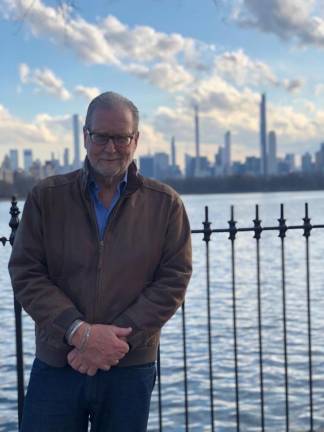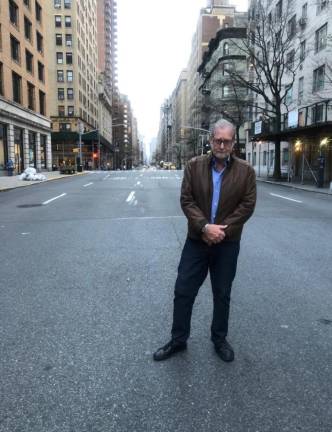Peter Greenberg has lived in his Upper East Side apartment for his entire life; and yet, he has probably spend more consecutive days in his home in the last few weeks than since her was a teenager. As the travel editor for CBS, and host for a PBS travel show, Greenberg visits approximately 35 countries traveling more than 400,000 miles each year.
“I'm going to Beirut like some people go to Starbucks,” Greenberg said in an interview with Our Town. Greenberg’s last venture was to St. Kitts in the Caribbean before jetting back to New York to shelter in place with his wife. Now, just like everyone else in the city, he’s figuring out how to adapt his life to the times.
What were some of the trips you were supposed to go on in the next month?
There are about 25 trips that were canceled or postponed range from Australia, to Vienna, from London to Norway, from Hawaii to Alabama, to speeches I was doing in both Palm Springs and Cancun, two seminars and conferences in New York and Chicago. And the list goes on. From March through July at this point, everything that was on my calendar is no longer on the calendar. Most of it has been postponed, but none of it has been guaranteed.
What is it like to be sedentary after being on the go 24/7 for so long?
You say sedentary — I'm a frequent traveler between my bedroom and the living room. Come on! What I have been doing is every night, I make a list of about — normally I make a list of about 70 people on a call the next day, anyway — but now that number 70 has a different definition, with very few exceptions. That 70 number represents people I've known all my life from all over the world that I haven't talked to in a while. And now I have the time to talk to them. And now I'm checking in on everybody. I have no other agenda, other than to call and say hi, and I find that very therapeutic. It's keeps us connected. And, and it in many cases opens the door to so many new conversations and ideas.
What is your new daily routine like at home?
It has become a routine now, which I never had before. What I'm doing now is every two days — I thank my wife for this — at five o'clock, we take a walk up to 96th Street and Fifth to the playground I used to play in when I was a baby and then go around the bridle path and take one walking lap around the reservoir, which up until now I haven't done since I was like 16. And then if we need to, stop at the grocery store and then walk home. That's our constitutional if you will. I'm still getting up at four in the morning. I'm still doing a ton of emails, making a lot of international phone calls. Then doing my doing my radio show. That's my CBS show. And then, I get to do something in the afternoon I never got to be before: take a nap. Then we have our walk. And then when we come back, I guarantee you I do not miss "Jeopardy" now. And I have to tell you in the last few weeks, I figured out I've won about $212,000. Virtually, of course.
Have you noticed anything that’s different about your neighborhood now that you have time to walk around?
Yes, and it’s not good. If you walk up Madison Avenue between 42nd and 96th Street, what you're now seeing, which you don't really see in a taxi or an Uber, but you can't miss it if you're walking, which I'm doing a lot of now, is every third store is vacant. Those were the stores that — if you do your homework — were probably vacant before coronavirus. And then what you're realizing are all the restaurants that are now closed.
What long-term effects do you see the pandemic having on the travel industry?
We're going to see fundamental change ... in the way we travel, and how we travel and how we spend our money to travel and what assurances we will demand before we travel. So you will see when we do get that green light, we will see an explosion in what? Domestic travel. Drive travel, car vacations, RV trips, trips under 500 miles. Because people will want to take baby steps, but they still want to get the hell out of the house. No international travel is going to happen successfully for the airlines or the hotels, and this also applies to the cruise lines unless there's a fundamental change in traveler assurance — meaning either a new kind of travel insurance policy, or where travel providers do self insurance to give travelers the option to cancel without penalty, or to fly them home at the first outbreak of any sort of virus. Without that, the subtext here is nobody's going to get on a plane and fly over a large body of water.
What are some other destinations in the world where you wouldn’t mind getting stuck and quarantined?
Southern Turkey right on the Mediterranean. I would think Tasmania. I would think Lucerne, Switzerland. There are some beautiful islands off the coast of Colombia. And what are all these places share in common? They're on the water, right, every one of them.
Is there anything you’ve learned from staying put for the last few weeks?
My father told me many, many years ago, it's not about being good or bad, right or wrong, left or right, or a winner or a loser. It's about adjusting; it’s about how well you adjust, how quickly you adjust and how sensitively you adjust. And guess what? America is now learning — whether they like it or not — how to adjust. And let's hope we adjust.

